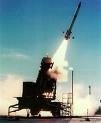KADENA AIR BASE, Japan -- Eyeing the threat of a potentially nuclear-armed North Korea, Japanese leaders are navigating delicate domestic politics and a complicated relationship with Japan's closest ally, the United States, as they embark on selective military improvements. The Japanese constitution, written with U.S. guidance in wake of Japan's catastrophic defeat in World War II, categorically prohibits a standing military. Since the 1950s, the nation has maintained "self-defense forces" that are military services in all but name. Nevertheless, legal limitations and a deep vein of pacifism among the Japanese electorate have hamstrung the development of these forces. Japan devotes only around 1 percent of its Gross Domestic Product to the military, versus America's 4 percent and between 2 and 3 percent for most Western nations. This is enough to maintain a mere 240,000 uniformed personnel, versus nearly 2 million in the United States. However, after North Korea's test of a Taepodong ballistic missile in August 1998, domestic pressure mounted for the Japanese government to field missile defenses similar to those being developed in the United States.
Eyeing North Korean Threat, Japan Bolsters Military Capabilities

